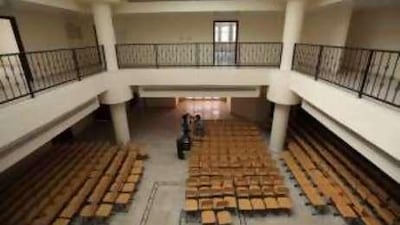ABU DHABI // Less than two months ago, NK Ramachandran heard about a school building in Musaffah that was waiting for a tenant. It had been built two years previously, but was unused. Mr Ramachandran spotted his chance. "I want to open schools all over the GCC region," he said yesterday, "so I am searching for opportunities."
Abu Dhabi certainly offered that. The capital was - and still is - suffering a chronic shortage of places at schools teaching the Indian curriculum. Existing schools say they have thousands of parents clamouring for a few hundred places. When The National reported yesterday that the Private International English School would open for applications this weekend, it was immediately inundated by pleas from parents for more information about how they could get on its list.
"Of course I knew about the need for Indian curriculum schools here," said Mr Ramachandran, the new school's managing director. "But the truth is that there is a need for good schools everywhere." He should know. As the regional director of the Bharatiya Vidya Bhavan (BVB) educational network, India's largest, he already oversees a school in Kuwait and one in Bahrain. Next year, he will add schools in Qatar and Oman to his responsibilities. Branches in Sharjah and Dubai are on the horizon, too.
The Abu Dhabi building, constructed to be used as a school or college, is owned by Sheikh Saeed bin Saif, the grandson of the Crown Prince. "I did not know His Highness [Sheikh Saeed] directly but a friend put me in touch with his office because the location would be perfect for my school," said Mr Ramachandran. On top of that, "it was built with all the requirements in place". He learnt that Sheikh Saeed wanted the school to be occupied by a company that was already known for its high standards. That, and the Indian-place shortage, made BVB a perfect fit. Mr Ramachandran made his offer.
Even with the building already in place, there was barely any time to prepare for the start of classes, scheduled for September 19. Mr Ramachandran's son, Sooraj, who will also be involved in the running of the school, said only the Sheikh's involvement made the rapid turnaround possible. "It is all thanks to the Sheikh that we were able to get things done so quickly and so well," he said. "We had all our paperwork ready and the Adec [Abu Dhabi Education Council] requirements were there when we started the approval process in June.
"Today, a month and a half later, all that is left to do is install the phone lines, which will be up and running today, and we can start showing parents around." The tours will begin next week, and when parents arrive Mr Ramachandran will be there to greet them. "I want to look after each and every aspect of this school," he said. "I want to answer the parents' questions myself and show them I am committed to their children's education."
It is that attention to detail that has allowed his school in Kuwait, the Indian Educational School, to prosper since it opened in 2006, even though the emirate already had plenty of Indian schools. "There were 17 Indian schools in Kuwait at the time, catering for around 40,000 to 45,000 students," he said. "I was ridiculed and told my school would fail, as there was no need for it." Early signs were not promising. The school opened with just 111 students. But within three months, it had registered 1,000 students and met its capacity of 2,400 students barely a year later.
"There will always be a need for unique schools," said Mr Ramachandran, "because parents care about their children's education more than they care about putting money in the bank." @Email:hkhalaf@thenational.ae

